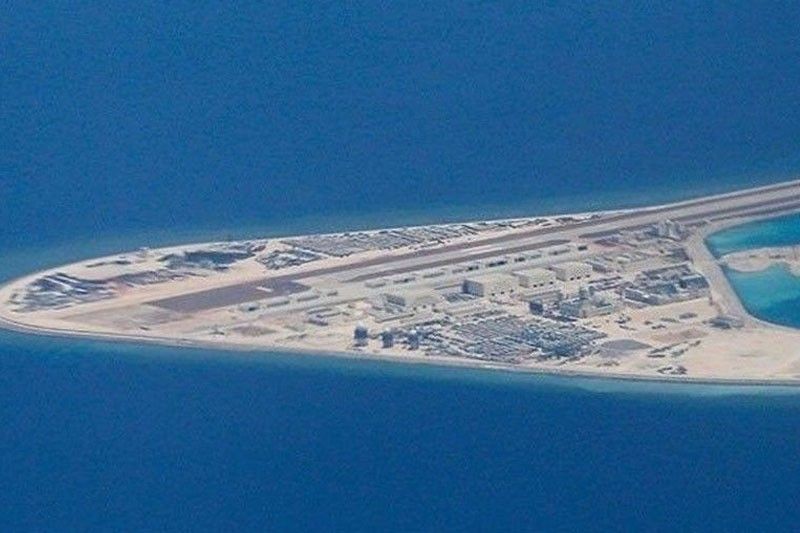No disengagement with China – President Marcos

WASHINGTON – Disengagement with China is not an option despite the Asian giant’s constantly stirring tension in the South China Sea, President Marcos said yesterday, as he vowed to continue counting on a “hotline” designed to prevent miscalculations in disputed waters.
“We constantly keep our lines of communications open,” Marcos said in response when asked at a forum organized by the Center for Strategic and International Studies how he intends to maintain a stable relationship with China while defending Philippine sovereignty.
“Disengagement is really not an option. We try to balance. In my first State of the Nation Address, I said that the Philippines’ foreign policy will keep the Philippines a friend to all and enemy to none,” he pointed out.
According to Marcos, he suggested the establishment of a communication system between the governments of the Philippines and China during his meeting with Chinese President Xi Jinping in Beijing last January.
“I proposed so as to avoid these incidents, these unfortunate incidents that we see every so often, such as the blocking of our fishermen from their fishing grounds, such as... well, intimidation really of many of our maritime forces... I suggested that we institute a system wherein we have a direct contact, one president to the other,” he said.
“In that way, no matter if I cannot speak for example to President Xi himself, I have someone that I can pick up the phone and call who I know and I have confidence in making my message to the President. And this works, of course, both ways,” he said.
Marcos said Foreign Affairs Secretary Enrique Manalo is working on the details of the system, which he refers to as a “hotline.”
“And hopefully that soon, we will have that in place, we will have that functioning,” the President said.
At the same forum, Marcos said the Philippines would continue to negotiate with China regarding their claims on the Malampaya natural gas fields. He noted that the negotiation would not be an easy process because of conflicting claims by the two countries.
“The only way to resolve the issues that are outstanding is to once again keep talking and to come to a consensus to come to an agreement and to continue to negotiate,” the President said.
“We continue to find a way – the essential problem, the essential roadblock to that whole process has been very simple,” he added.
The Malampaya gas field is a deep-water gas-condensate reservoir located 65 kilometers northwest of Palawan.
Marcos said China has been claiming some areas around Malampaya fields that are already recognized by the United Nations Convention on the Law of the Sea as part of the Philippines’ exclusive economic zone.
“So what happens now, especially when it comes to exploration in – for energy – for our energy needs are which law will apply, because we say this is part of Philippine territory and therefore Philippine law should apply,” Marcos said.
The President revealed that the two countries are “slowly inching towards a resolution.”
“It may have to come down to a compromise that will just limit that application, the application of laws maybe to the vessels that are involved in this exploration and exploitation of whatever natural gas fields we can access,” he said.
“There is no silver bullet where you say, we’ll do this and it’s done. As I said, we are inching slowly towards the resolution and that’s why we must be constant, we must be transparent and we must be accountable for all that we do. And I cannot see any other way to handle the problem other than that,” Marcos maintained.
New guidelines
In an interview with reporters, Marcos justified the adoption of new US-Philippines bilateral defense guidelines, which Beijing has described as “a move to meddle in the South China Sea issue.”
The guidelines, released during Marcos’ visit to the Pentagon last Thursday, seek to “deepen alliance cooperation and interoperability of the two countries across land, sea, air, space and cyberspace.”
Through the Bilateral Defense Guidelines (BDG), the Philippines’ Department of National Defense (DND) and its US counterpart “aim to strengthen the defense partnership through enhancing alliance coordination and bilateral planning; expanding information-sharing; modernizing defense capabilities; deepening interoperability and people-to-people ties, combatting transnational and non-conventional threats and contributing to global and regional peace and stability,” DND spokesman Arsenio Andolong said.
“It serves as a testament to the strong and enduring partnership between the Philippines and the United States, and reflects the shared commitment of both countries to uphold peace, stability and the rule of law in the region,” Andolong said, referring to the BDG.
Commenting on the BDG, Chinese foreign ministry spokesperson Mao Ning earlier said China “firmly opposes any country’s move to meddle in the South China Sea issue to harm China’s territorial sovereignty and maritime rights and interests by citing the guidelines.”
She added that the South China Sea is a shared home for countries in the region, “not a hunting ground for forces outside the region.”
Asked to react to China’s statement, Marcos said he did not feel alluded to by it but maintained that seeking partnerships is the right thing to do.
“How can anyone say that we are not a party and interest in all of these issues? So, I think that kind of statement was directed more towards the United States than it was for the Philippines,” the Chief Executive said.
“I think the Philippines’ actions in continuing to strengthen our capabilities to continue to find and forge partnerships with the United States and both in the governmental sector and also with the private corporations that we have spoken to... that is I think only right and proper because we in the Philippines need to do this if we are going to go forward and find new opportunities for our people,” he added. — Michael Punongbayan
- Latest
- Trending



























